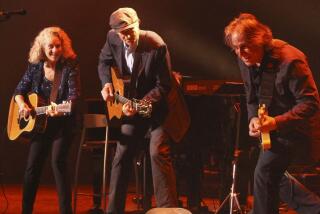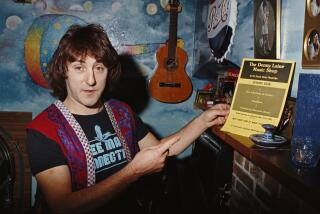Big-Band Nostalgia Is Their Beat
- Share via
It was a hot, dusty afternoon earlier this week. The door was closed tight to keep the air-conditioned air inside, but wisps of the blazing music leaked onto Laurel Canyon in Pacoima from a converted cinder-block garage attached to a modest bungalow.
In this garage, every Wednesday afternoon for 33 years (since mid-1955 that would be), Frank (Ace) Lane’s rehearsal band has gathered for a two-hour session with some of the best, most testing and forward-looking arrangements of the big band era.
The 17 players include alumni of many of the great bands--trombonist Bob Fitzpatrick from the Stan Kenton organization, others from Woody Herman, Charlie Barnet and several more. A lot of hair is silver, to match the horns, but the sounds are astonishingly young and vigorous.
A late-model Al Cohn chart on “Lover Come Back to Me” is taken at a tempo that suggests he or she will arrive on a dead run; “Besame Mucho” goes so swiftly there’ll be no more than a grazing peck on the cheek.
The five reeds, anchored by Dick Houlgate on baritone sax, negotiate the torrential runs with fine ensemble precision; the accents in the brasses are crisp and powerful and their choral wailings have a way of inducing shivers the way the bands always could. Jerry McKenzie on drums pushes the sound along with the almost melodic drive I associate with Buddy Rich.
It’s an amazing wave of music and, in the low-ceilinged, one-car garage it ought to be deafening. But the walls are covered with signs, posters and a couple of large hand-painted nudes, and there are oddments of furniture, including an abandoned bar, an easy chair and some folding chairs for visitors, and sufficient reverberations are absorbed to save the eardrums.
As always, the solo work is the spice that makes the difference. The choruses by Jimmy Zito on baritone trumpet, Herbie Harper on trombone, Dick Forrest on trumpet and fluegelhorn, John Bannister on piano and each of the saxes--Ira Schulman, John Newsome, Ray Reed, Fred Cooper and Houlgate--are splendid.
Ace Lane had been a big band trombonist, playing with Claude Thornhill, Charlie Barnet, Jerry Wald and Ray Anthony. He was then so badly hurt in a car crash that by the time he was fully recovered his era had waned. But he knew a lot of his fellow sidemen who wanted to play--to keep their chops up and, even more than that, just to play their kind of music. So he put out the rehearsal call, with enduring consequences.
“I added up the names eight years ago,” Lane said during a break the other afternoon, “and at that time 750 different musicians had played in the band. What the total is by now I don’t know.”
Lane has also acquired a library of 350 arrangements from the great bands of the era plus new charts in the big band style at its best. The arrangers are names generally unknown to the public but the players know them well, and when the Ace Lane band plays in public, as it does occasionally, the arrangers are usually mentioned with reverence.
A lot of factors killed the big band era. Led by Frank Sinatra, the singers began to be more important than the bands they sang in front of. Disc jockeys preferred vocals to instrumentals, which accelerated the trend. Wartime gas rationing killed off many of the outlying clubs and dance pavilions where the bands played. New and stridently different sounds caught the audiences’ ears--bop in the jazz field, rock ‘n’ roll in pop.
A few of the bands clung on and still do, old names with a second or third wave of leaders. But there are a whole generation of inspired big band sidemen--probably more in Los Angeles than anywhere in the country because of the studio and recording work--who don’t get to exercise their chops collectively the way they’d like to.
There is obviously still an audience for big bands, and a young audience as well as those who remember when. But the economics are defeating for all but a handful of the so-called ghost bands. For the players, the rehearsal bands are an answer.
“Ah, the chance to play,” Jimmy Zito said with satisfaction Wednesday afternoon.
The Ace Lane band is doing one of its rare public gigs Sunday afternoon from 3 to 6 at the Improv, 8162 Melrose Ave., and on the Wednesday evidence a working title could be ‘Nostalgia Was Never Like This.’ It is a today sound, born yesterday.
More to Read
The biggest entertainment stories
Get our big stories about Hollywood, film, television, music, arts, culture and more right in your inbox as soon as they publish.
You may occasionally receive promotional content from the Los Angeles Times.









